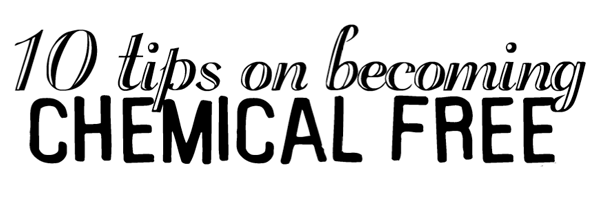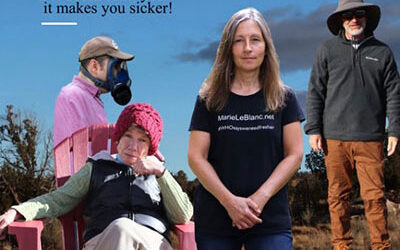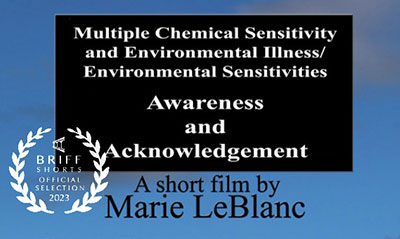
Billie and Basil's “10 Tips on Becoming Chemical Free”
May is MCS Awareness Month, and Planet Thrive urges you to go fragrance and chemical free for the entire month in honor of those who suffer from this debilitating illness. You might be wondering – what is MCS? MCS stands for Multiple Chemical Sensitivity, also referred to as chemical sensitivity, environmental sensitivity, environmental illness, toxicant induced loss of tolerance (TILT), chemical intolerance, and other terms. It is a condition characterized by an acute intolerance to low levels of a range of substances, including chemicals, electromagnetic fields (EMFs), and/or molds. Exposure to extremely low levels of the offending substance cause a wide variety of symptoms, ranging in severity from mild to completely debilitating, and can even be life-threatening. Chemical sensitivity can affect multiple organ systems and is often progressive if lifestyle changes are not implemented. There have been several reported deaths from this illness. Read more about MCS from last year’s awareness month post.
Not sure what fragrance free entails? Author, poet, and patient-activist Peggy Munson spells it out for you in her PDF download “How to be Fragrance Free.” Some highlights from her brochure:
Why should I be fragrance free?
Wearing scented products causes harm to others, and limits disability access for people with chemical sensitivities. If you are able-bodied, you might be doing a very disabled person a great favor by being fragrance free. If you are disabled, you will help to create a more unified and inclusive disability movement. You will benefit the environment. You will put economic pressure on companies that still don’t have to regulate toxic topical chemicals the way ingested chemicals are regulated. You will release people with MCS from chemical exile.What if I cheat just a little?
Sometimes, for the chemically sensitive, a little compliance can be worse than none at all, so be as thorough as you can. Think of the analogy of natural gas used in homes. An odor was added to the gas so that people would be able to detect and avoid its dangerous and possibly deadly effects, and call for help. Sometimes, ironically, people wearing heavy scents are easier for the chemically sensitive to avoid. You might think to yourself that you are helping a chemically sensitive person by changing to one or two fragrance-free products, but this isn’t always true, unless you refrain from all scented products before seeing the person. However, please don’t use this logic to ignore the process altogether; you’re still benefiting everyone’s health by being fragrance-free, as many fragrances contain neurotoxic and carcinogenic ingredients.”
Need some suggestions on how to remove chemical products from your life? Filmmakers and activists Billie Rain and Basil Shadid created this cute flyer “10 Tips on Becoming Chemical Free.” Our favorites:
3. Stop using dryer sheets!
5. Throw that cologne and perfume out. You smell fine.
8. Cancel your chemical lawn treatment program.
10. Replace air fresheners with plants that clean the air (like spider plants!).
Planet Thrive thanks all those patient-activists out there who are creating educational flyers and brochures such as these to help make the invisible visible not just for awareness month in May, but every month.
Do you have a brochure or flyer you’d like to share with our readers? Send us a link today so we can feature it for MCS Awareness Month.









Go fragrance-free forever! There are natural smells that are much much nicer & healthier for the environment, humans and pets.
I don’t know why people use so obviously synthetic fragrances and then so much of them that even an untrained human nose can smell them for miles and for long after they left (on everything they touched).
It’s really bad. Imagine you are a dog lover and mask your own smell with something so powerful which means nothing in nature – it certainly won’t be as pleasant for your dog than if you’d smell like yourself!
The same is true for rats which apparently have even better noses than dogs, and certainly also other animals. I think this is also true for human babies and of course other people like me whose modest olfactory sense is easily overpowered by chemical smells others wear because they think it makes them better (?).
I am very new at doing online stuff but I have come to the conclusion that what my grandmother said “Do it and it’s done” is true so I put together a petition and hope word gets around in chemical sensitivity community, COPD and Asthma folks to look at my petition and sign if they agree so that three of the major manufacturers of cleaning, laundry and scented candle/plug in type products can hear from a lot of people instead of just me like an old crank, which I admit I am. Please forward this to anyone affected by fragrances for any health reason.
Sorry my “start up” of my campaign is a little wordy and discombobulated but these companies keep telling me there products are not bothering anybody so they need to hear from bothered people who can’t leave their windows open on neighbors laundry day etc!
Church and Dwight, Proctor and Gamble and SCJohnson: re-examine scented product formulas to see what is making some people sick by Rebecca Neary
and here is the link http://www.change.org/petitions/church-and-dwight-proctor-and-gamble-and-scjohnson-re-examine-scented-product-formulas-to-see-what-is-making-some-people-sick-3
It would be great if people were very specific about how fragrances affect them when saying why they sign. these companies claim no one complains except me.
Rebecca Neary
San Diego CA